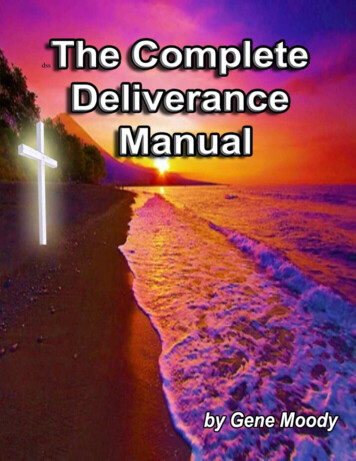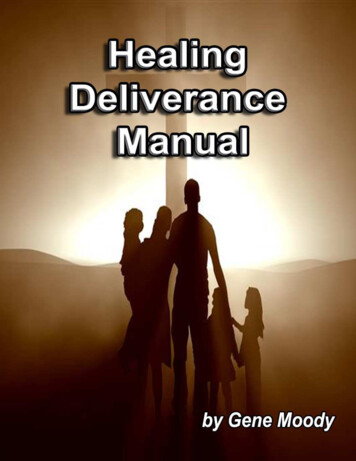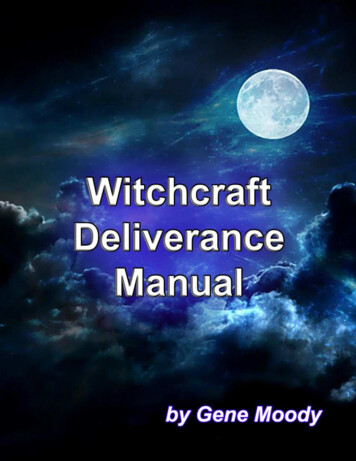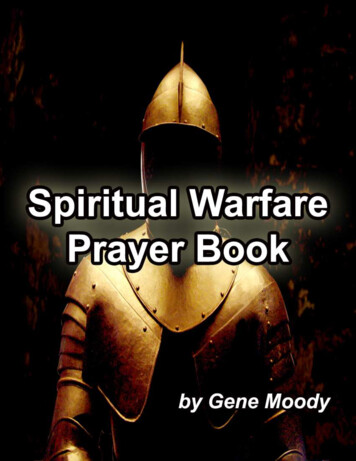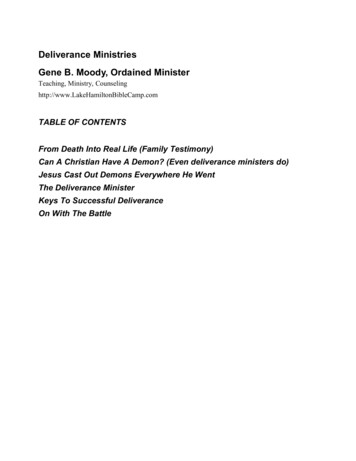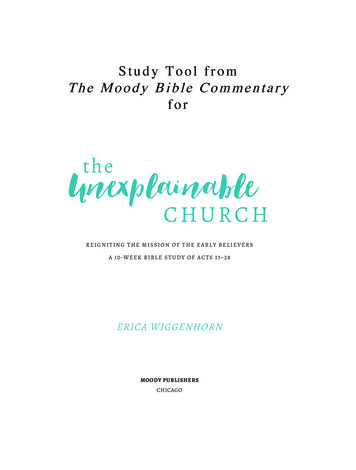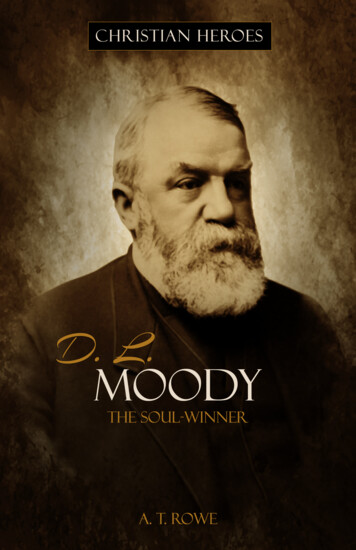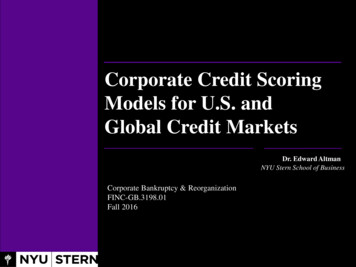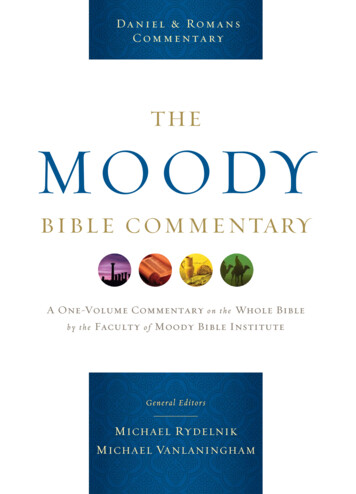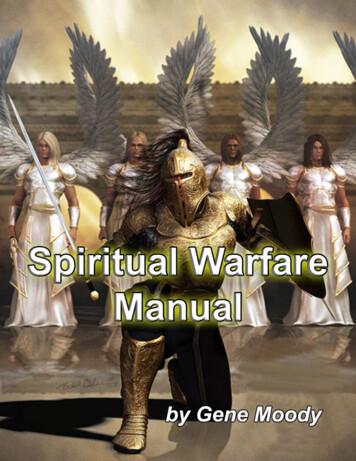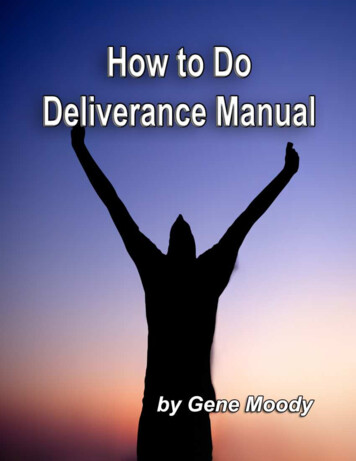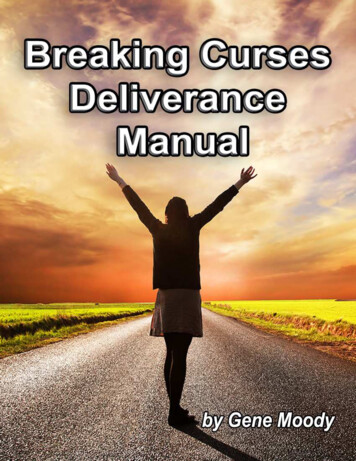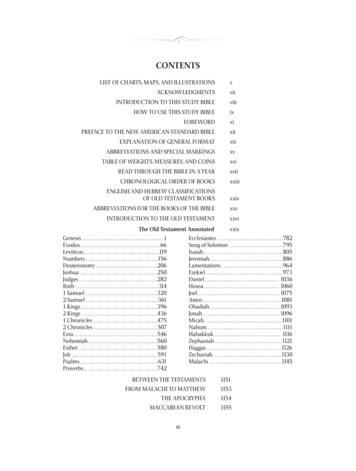
Transcription
&n7CONTENTSList of Charts, Maps, and IllustrationsvACKNOWLEDGMENTSviiINTRODUCTION TO THIS STUDY BIBLEviiiHOW TO USE THIS STUDY BIBLEixForewordxiPreface to the New American Standard BiblexiiExplanation of GENERAL FORMATxivABBREVIATIONS AND SPECIAL MARKINGSxvTABLE OF WEIGHTS, MEASURES, AND COINSxviREAD THROUGH THE BIBLE IN A YEARxviiCHRONOLOGICAL ORDER OF BOOKSxxiiiENGLISH AND HEBREW CLASSIFICATIONSOF OLD TESTAMENT BOOKSxxivABBREVIATIONS FOR THE BOOKS OF THE BIBLExxvINTRODUCTION TO THE OLD TESTAMENTxxviThe Old Testament AnnotatedxxixGenesis. . . . . . . . . . . . . . . . . . . . . . . . . . . . . . . . . . . . . . . . . 1Exodus. . . . . . . . . . . . . . . . . . . . . . . . . . . . . . . . . . . . . . . . . 66Leviticus. . . . . . . . . . . . . . . . . . . . . . . . . . . . . . . . . . . . . . 119Numbers. . . . . . . . . . . . . . . . . . . . . . . . . . . . . . . . . . . . 156Deuteronomy. . . . . . . . . . . . . . . . . . . . . . . . . . . . . . . 206Joshua. . . . . . . . . . . . . . . . . . . . . . . . . . . . . . . . . . . . . . . 250Judges . . . . . . . . . . . . . . . . . . . . . . . . . . . . . . . . . . . . . . . 282Ruth . . . . . . . . . . . . . . . . . . . . . . . . . . . . . . . . . . . . . . . . . . 3141 Samuel. . . . . . . . . . . . . . . . . . . . . . . . . . . . . . . . . . . . 3202 Samuel. . . . . . . . . . . . . . . . . . . . . . . . . . . . . . . . . . . . . 3611 Kings. . . . . . . . . . . . . . . . . . . . . . . . . . . . . . . . . . . . . . .3962 Kings. . . . . . . . . . . . . . . . . . . . . . . . . . . . . . . . . . . . . . 4361 Chronicles . . . . . . . . . . . . . . . . . . . . . . . . . . . . . . . . 4752 Chronicles. . . . . . . . . . . . . . . . . . . . . . . . . . . . . . . . 507Ezra. . . . . . . . . . . . . . . . . . . . . . . . . . . . . . . . . . . . . . . . . . 546Nehemiah. . . . . . . . . . . . . . . . . . . . . . . . . . . . . . . . . . . 560Esther. . . . . . . . . . . . . . . . . . . . . . . . . . . . . . . . . . . . . . . . 580Job. . . . . . . . . . . . . . . . . . . . . . . . . . . . . . . . . . . . . . . . . . . 591Psalms. . . . . . . . . . . . . . . . . . . . . . . . . . . . . . . . . . . . . . . . 631Proverbs. . . . . . . . . . . . . . . . . . . . . . . . . . . . . . . . . . . . . 742Ecclesiastes . . . . . . . . . . . . . . . . . . . . . . . . . . . . . . . . . 782Song of Solomon . . . . . . . . . . . . . . . . . . . . . . . . . . . 795Isaiah. . . . . . . . . . . . . . . . . . . . . . . . . . . . . . . . . . . . . . . . 805Jeremiah. . . . . . . . . . . . . . . . . . . . . . . . . . . . . . . . . . . . . 886Lamentations. . . . . . . . . . . . . . . . . . . . . . . . . . . . . . . 964Ezekiel. . . . . . . . . . . . . . . . . . . . . . . . . . . . . . . . . . . . . . . 973Daniel. . . . . . . . . . . . . . . . . . . . . . . . . . . . . . . . . . . . . . 1036Hosea. . . . . . . . . . . . . . . . . . . . . . . . . . . . . . . . . . . . . . . 1060Joel. . . . . . . . . . . . . . . . . . . . . . . . . . . . . . . . . . . . . . . . . . 1075Amos. . . . . . . . . . . . . . . . . . . . . . . . . . . . . . . . . . . . . . . 1081Obadiah. . . . . . . . . . . . . . . . . . . . . . . . . . . . . . . . . . . . 1093Jonah. . . . . . . . . . . . . . . . . . . . . . . . . . . . . . . . . . . . . . . 1096Micah. . . . . . . . . . . . . . . . . . . . . . . . . . . . . . . . . . . . . . . 1101Nahum. . . . . . . . . . . . . . . . . . . . . . . . . . . . . . . . . . . . . . 1111Habakkuk. . . . . . . . . . . . . . . . . . . . . . . . . . . . . . . . . . . 1116Zephaniah. . . . . . . . . . . . . . . . . . . . . . . . . . . . . . . . . . 1121Haggai. . . . . . . . . . . . . . . . . . . . . . . . . . . . . . . . . . . . . . 1126Zechariah. . . . . . . . . . . . . . . . . . . . . . . . . . . . . . . . . . 1130Malachi. . . . . . . . . . . . . . . . . . . . . . . . . . . . . . . . . . . . 1145BETWEEN THE TESTAMENTS1151FROM MALACHI TO MATTHEW1153THE APOCRYPHA1154MACCABEAN REVOLT1155iiiRyNASB 00 FRONTMatter 111228.indd 31/5/12 3:36 PM
&n7HARMONY OF THE GOSPELS1156INTRODUCTION TO THE NEW TESTAMENT1163NEW TESTAMENT BOOKSand POLITICAL BACKGROUND1165PALESTINE AND THE ROMAN EMPIRE1166MIRACLES OF JESUS1167MESSIANIC PROPHECIES1168INTRODUCTION TO THE GOSPELS1169COMPARISON OF THE FOUR GOSPELSand WORDS OF CHRIST IN THE FOUR GOSPELS1170The New Testament Annotated1171Matthew. . . . . . . . . . . . . . . . . . . . . . . . . . . . . . . . . . . . 1173Mark. . . . . . . . . . . . . . . . . . . . . . . . . . . . . . . . . . . . . . . . 1223Luke. . . . . . . . . . . . . . . . . . . . . . . . . . . . . . . . . . . . . . . . 1254John. . . . . . . . . . . . . . . . . . . . . . . . . . . . . . . . . . . . . . . . . 1300Acts. . . . . . . . . . . . . . . . . . . . . . . . . . . . . . . . . . . . . . . . . 1338Romans. . . . . . . . . . . . . . . . . . . . . . . . . . . . . . . . . . . . .13871 Corinthians. . . . . . . . . . . . . . . . . . . . . . . . . . . . . . 14102 Corinthians. . . . . . . . . . . . . . . . . . . . . . . . . . . . . . 1433Galatians. . . . . . . . . . . . . . . . . . . . . . . . . . . . . . . . . . . 1448Ephesians. . . . . . . . . . . . . . . . . . . . . . . . . . . . . . . . . . 1457Philippians. . . . . . . . . . . . . . . . . . . . . . . . . . . . . . . . . 1466Colossians. . . . . . . . . . . . . . . . . . . . . . . . . . . . . . . . . .14731 Thessalonians. . . . . . . . . . . . . . . . . . . . . . . . . . . 14802 Thessalonians. . . . . . . . . . . . . . . . . . . . . . . . . . . 14871 Timothy . . . . . . . . . . . . . . . . . . . . . . . . . . . . . . . . . . 14912 Timothy. . . . . . . . . . . . . . . . . . . . . . . . . . . . . . . . . . 1499Titus. . . . . . . . . . . . . . . . . . . . . . . . . . . . . . . . . . . . . . . . 1505Philemon. . . . . . . . . . . . . . . . . . . . . . . . . . . . . . . . . . . 1510Hebrews. . . . . . . . . . . . . . . . . . . . . . . . . . . . . . . . . . . . 1514James. . . . . . . . . . . . . . . . . . . . . . . . . . . . . . . . . . . . . . . 15331 Peter. . . . . . . . . . . . . . . . . . . . . . . . . . . . . . . . . . . . . . 15412 Peter. . . . . . . . . . . . . . . . . . . . . . . . . . . . . . . . . . . . . . 15491 John. . . . . . . . . . . . . . . . . . . . . . . . . . . . . . . . . . . . . . . 15542 John. . . . . . . . . . . . . . . . . . . . . . . . . . . . . . . . . . . . . . . 15623 John. . . . . . . . . . . . . . . . . . . . . . . . . . . . . . . . . . . . . . . 1564Jude. . . . . . . . . . . . . . . . . . . . . . . . . . . . . . . . . . . . . . . . . 1566Revelation. . . . . . . . . . . . . . . . . . . . . . . . . . . . . . . . . . 1569INDEX TO PRINCIPAL SUBJECTSIN THE NOTES1599A SYNOPSIS OF BIBLE DOCTRINE1607THE INSPIRATION OF THE BIBLE1633UNDERSTANDING THE BIBLE1636HOW WE GOT OUR BIBLE1638THE MEANING AND BLESSINGSOF SALVATION1640ARCHAEOLOGY AND THE BIBLE1643A BRIEF SURVEY OF CHURCH HISTORY1646TOPICAL INDEX OF SCRIPTURE1656CONCORDANCE1695TIMELINE1787MAP INDEX1795MAPSivRyNASB 00 FRONTMatter 111228.indd 41/5/12 3:36 PM
I n t r o d u c t i o nt oGenesis7n&A UT H OR : M o s e sD A T E : 14 5 0 -14 1 0b.c.since World War I), have demonstrated the historicalaccuracy of the Pentateuch and have brought to lightcustoms practiced in the second millennium b.c. thatwere not practiced in the first millennium b.c. How,then, would an author have known of these customs(e.g., the double portion going to the oldest son, the saleof a birthright, the validity of an oral will; cf. Gen. 48:1720) unless he had lived during that earlier period?Undoubtedly, Moses had both oral and writtenrecords of early history, which he used under theguidance of the Holy Spirit to write about events thatantedated his own life. Naturally, someone else musthave written the account of his death (Deut. 34).TitleThe English word genesis comes, by way of Latin, fromthe Greek title to this book. In Hebrew, the book wasnamed from its first word, which means “in the beginning.” Genesis means “origin” and thus is an apt title fora book that reveals the origins of all human history.AuthorshipGenesis is the first book of a larger work, the first fivebooks of the Old Testament, called the Pentateuch, theauthorship of which has traditionally been ascribedto Moses. This is supported by the following considerations: (1) the Pentateuch itself affirms Moses as itsauthor (Ex. 17:14; 24:4, 7; 34:27; Num. 33:1-2; Deut.31:9); (2) other Old Testament books testify to theMosaic authorship of the Pentateuch (Josh. 1:7-8; 8:32,34; 22:5; 1 Kings 2:3; 2 Kings 14:6; 21:8; Ezra 6:18; Dan.9:11-13; Mal. 4:4); (3) the New Testament affirms thesame (Matt. 19:8; Mark 12:26; John 5:46-47; 7:19; Rom.10:5); (4) eyewitness details point to a participant beingthe author, not an editor who lived centuries later (Ex.15:27; Num. 2:1-31; 11:7-8); (5) the author’s informationabout Egyptian names, words, customs, and geographywould have been difficult for an author or editor tohave obtained in Canaan centuries after Moses’ time(Gen. 13:10; 16:1-3; 33:18; 41:43; cf. Acts 7:22).The critical view of the authorship of the Pentateuchhas passed through several stages. At first, Genesis wasdivided into two documents on the basis of the use ofthe two different names for God: Elohim and Yahweh.About 1875, Julius Wellhausen argued for four documents—named J, E, P, and D—from which the entirePentateuch was compiled. J was written about 850b.c. by an unknown writer in Judah; E was writtenabout 750 b.c. by an unknown writer in the Northern Kingdom of Israel; D was composed by a highpriest at the time of the revival under King Josiah in621 b.c.; and P was composed from the time of Ezekiel to Ezra. Archaeological discoveries, however (manyContentsGenesis is a real-life history of individual people, afact that is emphasized by the 10 sections (followingthe prologue, 1:1-2:3) that usually begin “these are therecords of the generations of” (6:9; 10:1; 11:10; 11:27;25:12; 25:19; 36:1; 37:2; cf. 2:4; 5:1). This thrust provides a natural unity to the book (cf. Luke 3:23-38).Genesis is a book about the beginning of manythings: the world, man, sin, civilization, the nations,and Israel.Genesis also contains important theological themes:the doctrine of the living, personal God; the doctrine ofman made in the image of God, then of sinful man; theanticipation of a Redeemer (3:15); and the covenantpromises made to the nation Israel (12:1-3; 15:18-21).Genesis is a book unique among all Near Easternliterature and foundational to all the other books ofthe Bible.Outline of GenesisI. The Creation of the World, 1:1-2:25A. The Beginning of Creation, 1:1-2B. The Days of Creation, 1:3-2:3C. The Beginnings of Man and Woman, 2:4-251RyNASB 01 Genesis 111217.indd 112/17/11 12:38 PM
&n7A. The Birth of Jacob and Esau, and Selling ofEsau’s Birthright, 25:19-34B. Isaac and Abimelech, 26:1-35C. The Blessing of Jacob by Deception, 27:1-46D. Jacob’s Flight to Paddan-aram (Mesopotamia),28:1-9E. Jacob’s Dream at Bethel, 28:10-22F. Jacob and the Daughters of Laban, 29:1-30:431. Jacob meets Rachel, 29:1-142. Jacob marries Leah and Rachel, 29:15-303. Jacob begets children, 29:31-30:244. Jacob bargains with Laban, 30:25-43G. Jacob’s Return to Canaan, 31:1-33:201. His separation from Laban, 31:1-552. His reconciliation with Esau, 32:1-33:20H. Jacob’s Later Life, 34:1-36:431. The massacre at Shechem, 34:1-312. The renewal of the covenant at Bethel,35:1-153. The deaths of Rachel and Isaac, 35:16-294. The descendants of Esau, 36:1-43II. The Sin of Man, 3:1-24A. The Temptation, 3:1-7B. The Judgments, 3:8-24III. The Beginnings of Civilization, 4:1-5:32A. Cain and His Descendants, 4:1-24B. Seth, 4:25-26C. Adam to Noah, 5:1-32IV. The History of Noah, 6:1-9:29A. The Causes of the Flood, 6:1-13B. The Course of the Flood, 6:14-8:19C. The Events After the Flood, 8:20-9:29V. The Descendants of Noah and the Tower ofBabel, 10:1-11:26A. The Sons of Japheth, 10:1-5B. The Sons of Ham, 10:6-20C. The Sons of Shem, 10:21-32D. The Tower of Babel, 11:1-9E. The Descendants of Shem, 11:10-26VI. The History of Abraham, 11:27-25:11A. The Family of Abram, 11:27-32B. The Call of Abram, 12:1-20C. The Separation of Abram and Lot, 13:1-18D. The Deliverance of Lot by Abram, 14:1-24E. The Covenant with Abram, 15:1-21F. The Birth of Ishmael, 16:1-16G. The Circumcision of Abraham, 17:1-27H. The Destruction of Sodom and Gomorrah,18:1-19:38I. Abraham and Abimelech, 20:1-18J. The Birth of Isaac, 21:1-34K. The Offering of Isaac, 22:1-24L. The Death and Burial of Sarah, 23:1-20M. The Marriage of Isaac, 24:1-67N. The Death of Abraham, 25:1-11IX. The History of Joseph, 37:1-50:26A. Joseph Sold into Slavery, 37:1-36B. Judah and Tamar, 38:1-30C. Joseph in Potiphar’s House, 39:1-23D. Joseph Interprets the Dreams of theCupbearer and the Baker, 40:1-23E. Joseph Interprets Pharaoh’s Dream, 41:1-57F. Joseph’s Brothers in Egypt, 42:1-45:281. The first visit of his ten brothers, 42:1-382. The second visit of his eleven brothers,43:1-44:343. Joseph’s revelation of his identity, Gen 45:1-28G. Joseph’s Family in Egypt, 46:1-47:31H. The Blessing of Joseph’s Sons, 48:1-22I. Jacob’s Blessing of His Sons, 49:1-27J. Jacob’s Death and Burial, 49:28-50:14K. The Last Days of Joseph, 50:15-26VII. The Descendants of Ishmael, 25:12-18VIII. The History of Isaac and His Sons, 25:19-36:43TIMELINE OF GENESISC R E AT I O NTower ofNoah Babel65005000Earliest culturein ptian DynastiesbeginJosephsold into Death ofslavery JosephJacobborn20562006199118971804Destruction ofEgyptian MiddleSodom & GomorrahKingdom2RyNASB 01 Genesis 111217.indd 212/17/11 12:38 PM
The BookofGenesis7n&I.The Creation of the World,1:1-2:25A.1The Beginning of Creation, 1:1-2aIn the beginning bGod ccreated the heavens and the earth. 2 The earth was 1aform less and void, and bdarkness was over the2surface of the deep, and cthe Spirit of Goddwas 3 moving over the 2 surface of the waters.B. The Days of Creation, 1:3-2:33Then aGod said, “Let there be light”; and therewas light. 4 God saw that the light was agood;and God bseparated the light from the darkness. 5 aGod called the light day, and the darkness He called night. And bthere was eveningand there was morning, one day.6Then God said, “Let there be 1an aexpansein the midst of the waters, and let it separateChapter 11aPs 102:25; Is 40:21;John 1:1, 2; Heb 1:10 bPs89:11; 90:2; Acts 17:24;Rom 1:20; Heb 11:3cJob 38:4; Is 42:5; 45:18;Rev 4:112 1Or a waste andemptiness 2Lit face of3Or hovering aJer 4:23bJob 38:9 cPs 104:30; Is40:13, 14 dDeut 32:11;Is 31:53aPs 33:6, 9; 2 Cor 4:64aPs 145:9, 10 bIs 45:75aPs 74:16 bPs 65:861Or a firmamentaIs 40:22; Jer 10:12;2 Pet 3:571Or firmament aJob38:8-11 bPs 148:481Or firmament9aPs 104:6-9; Jer 5:22;2 Pet 3:5 bPs 24:1,2; 95:510aPs 33:7; 95:5; 146:6111Or grass 2Or herbs 3Litits 4Lit in which is its seed1:1 In the beginning. Not of eternity, but of the creation of theworld as described in this chapter. This marks the first break inthe past endless eternity. God. Lit., Elohim, a generic term fordeity as well as a proper name for the true God. It is used of pagangods (31:30; Ex. 12:12), angels (Ps. 8:5), men (Ps. 82:6), and judges(Ex. 21:6), though most frequently of the true God. Its basic meaning is “strong one, mighty leader, supreme Deity.” The form ofthe word is plural, indicating plentitude of power and majestyand allowing for the NT revelation of the triunity of the Godhead.Cf. note on Gen. 2:4. created. Heb. bara, used also in verses 21and 27. The word itself does not preclude the use of preexistingmaterial (Isa. 65:18), though none is mentioned or implied here(cf. other occurrences in Ps. 51:10; Isa. 65:17; Amos 4:13). Barameans essentially the same as asa, “to do or make” (used in v. 25and also of the entire creative activity in Ex. 20:11 and Neh. 9:6).A third word for God’s creative activity, yasar (“formed”), occurs inGen. 2:7. the heavens and the earth. I.e., the universe.1:2 The earth was formless and void. Some understand a “gap”of an indeterminate period of time between verses 1 and 2, andtranslate “became” rather than “was.” Although the Hebrewword may mean “became” (as in 19:26), the construction ofthe clause does not support a consecutive statement describing something that happened subsequent to verse 1 (“and”)but rather describing something included in verse 1 (“but”). Inother words, the initial creation was formless and empty, a condition soon remedied. See note on Isa. 45:18. The phrase meansthat at this point in God’s creative activity the earth was yetunfashioned and uninhabited. the deep. Not a reference to themythological Babylonian monster Tiamat, as has been alleged,but simply “waters.” moving over. I.e., in the sense of protectingand participating in the creative work (the same Hebrew wordis used in Deut. 32:11).1:3 light. Not the sun (which was created on the fourth day, v.the waters from the waters.” 7 God made theexpanse, and separated athe waters which werebelow the 1expanse from the waters bwhichwere above the 1expanse; and it was so. 8 Godcalled the 1expanse heaven. And there was evening and there was morning, a second day.9Then God said, “aLet the waters belowthe heavens be gathered into one place, andlet bthe dry land appear”; and it was so. 10 Godcalled the dry land earth, and the agathering ofthe waters He called seas; and God saw thatit was good. 11 Then God said, “Let the earthsprout 1avegetation, 2 plants yielding seed, andfruit trees on the earth bearing fruit after 3 theirkind 4 with seed in them”; and it was so. 12 Theearth brought forth 1vegetation, 2 plants yielding seed after 3 their kind, and trees bearing1aPs 65:9-13; 104:14; Heb 6:7 121Or grass 2Or herbs 3Lit its16), but some fixed light source outside the earth. In referenceto that light, the rotating earth passed through a day-night cycle.1:4 God separated. The first of three separations. Here, lightfrom darkness; then sky from water (v. 7); and finally, the landfrom the seas (v. 9). Only when this spatial separation was complete did God pronounce everything good (v. 10). He called thefinished creation very good (v. 31).1:5 And there was evening and there was morning, one day(better, day one). Later Jewish reckoning began the day witheventide (Lev. 23:32). That may be the reason for the order here,or it may simply mean that one day-night cycle was completed.Since daytime closes at evening and the night ends with themorning, the phrase indicates that the first day and night hadbeen completed. Evening and morning cannot be construed tomean an age, but only a day; everywhere in the Pentateuchthe word day, when used (as here) with a numerical adjective,means a solar day (now calibrated as 24 hours).1:6 an expanse. From a verb meaning “to beat out and spreadout”; i.e., the open expanse of the heavens, which appeared asa vast canopy or tent above the earth.1:7 the waters which were above. Apparently God suspendeda vast body of water in vapor form over the earth, making acanopy that caused conditions on the earth to resemble thoseinside a greenhouse. This may account for the longevity ofhuman life (Gen. 5) and for the tremendous amount of waterinvolved in the worldwide flood (Gen. 6-9).1:10 God called. The act of naming this and other parts of thecreation was, in the Semitic world, an evidence of lordship (cf.2 Kings 23:34). Note the significance of this in 2:19.1:11 after their kind. There are fixed boundaries beyond whichreproductive variations cannot go, but it is impossible to knowwhether “kind” is to be equated with families, genera, or someother category of biological classification.3RyNASB 01 Genesis 111217.indd 312/17/11 12:38 PM
G e n e s i s 1 : 13&n7fruit 4 with seed in them, after 3 their kind; andGod saw that it was good. 13 There was eveningand there was morning, a third day.14Then God said, “Let there be 1alights in the2bexpanse of the heavens to separate the dayfrom the night, and let them be for csigns andfor dseasons and for days and years; 15 and letthem be for 1lights in the 2 expanse of the heavens to give light on the earth”; and it was so.16God made the two 1great lights, the agreater2light 3 to govern the day, and the lesser 2 light3to govern the night; He made bthe stars also.17 aGod placed them in the 1expanse of theheavens to give light on the earth, 18 and 1toagovern the day and the night, and to separatethe light from the darkness; and God saw thatit was good. 19 There was evening and therewas morning, a fourth day.20Then God said, “Let the waters 1teem withswarms of living creatures, and let birds flyabove the earth 2 in the open 3 expanse of theheavens.” 21 God created athe great sea monsters and every living creature that moves,with which the waters swarmed after theirkind, and every winged bird after its kind; andGod saw that it was good. 22 God blessed them,saying, “Be fruitful and multiply, and fill the12 3Lit its 4Lit in whichis its seed141Or luminaries, light-bearers 2Or firmamentaPs 74:16; 136:7 bPs19:1; 150:1 cJer 10:2 dPs104:19151Or luminaries, lightbearers 2Or firmament161Or luminaries, lightbearers 2Or luminary,light-bearer 3Lit for thedominion of aPs 136:8, 9bJob 38:7; Ps 8:3; Is 40:26171Or firmament aJer33:20, 25181Lit for the dominionof aJer 31:35201Or swarm 2Lit on theface of 3Or firmament21aPs 104:25-28241Lit its aGen 2:19;6:20; 7:14; 8:19251Lit its aGen 7:21, 22;Jer 27:5261Lit heavens aGen 3:22;11:7 bGen 5:1; 9:6; 1 Cor11:7; Eph 4:24; James3:9 cPs 8:6-827aGen 5:1f; 1 Cor 11:7;Eph 4:24; Col 3:10 bMatt19:4; Mark 10:6281Lit heavens 2Or creepsaGen 9:1, 7; Lev 26:9; Ps127:3, 5291Lit face of 2Lit inwhich is the fruit of a treeyielding seed aPs 104:14;136:254waters in the seas, and let birds multiply onthe earth.” 23 There was evening and there wasmorning, a fifth day.24 aThen God said, “Let the earth bring forthliving creatures after 1their kind: cattle andcreeping things and beasts of the earth after1their kind”; and it was so. 25 God made theabeasts of the earth after 1their kind, and thecattle after 1their kind, and everything thatcreeps on the ground after its kind; and Godsaw that it was good.26Then God said, “Let aUs make bman inOur image, according to Our likeness; and letthem crule over the fish of the sea and over thebirds of the 1sky and over the cattle and overall the earth, and over every creeping thing thatcreeps on the earth.” 27God created man ain Hisown image, in the image of God He createdhim; bmale and female He created them. 28 Godblessed them; and God said to them, “aBe fruitful and multiply, and fill the earth, and subdueit; and rule over the fish of the sea and overthe birds of the 1sky and over every living thingthat 2 moves on the earth.” 29 Then God said,“Behold, aI have given you every plant yielding seed that is on the 1surface of all the earth,and every tree 2 which has fruit yielding seed;NA MES OF EANINGREFERENCESStrong OneLord (Master)I am the One who isGodLordMasterFatherGenesis 1:1Joshua 5:14Exodus 3:14Matthew 1:23Matthew 5:33Acts 4:24John 4:24; 15:161:14-19 The light source of the first day was replaced by the sunand moon. Their purposes were to distinguish day and night,to be signs (by which men get their bearings, as well as signsof judgment, Matt. 24:29), to mark off the seasons, and to givelight to the earth.1:21 good. I.e., beautiful and in perfect ecological balance.1:24 cattle. I.e., large, domesticated quadrupeds. creeping things.I.e., creatures that move on the earth or close to it, having nolegs or, at best, only short ones (e.g., worms, insects, and reptiles).1:26 Us . . . Our. Plurals of majesty. image . . . likeness. Interchangeable terms (5:3) indicating that man was created in anatural and moral likeness to God. When he sinned, he lost theRyNASB 01 Genesis 111217.indd 4moral likeness, which was his sinlessness, but the natural likenessof intellect, emotions, and will he still retains (cf. 9:6; James 3:9).1:27 man. The word is used generically here, then amplified bythe phrase male and female (although Eve’s physical formationis not detailed until 2:18-23).1:28 fill. The word cannot be used to support the idea of a refilling of the earth after destruction of an earlier civilization, assome theories hold. subdue . . . rule. Man, as God’s representative, is to rule the earth. But when he sinned, he lost the abilityto do that fully. (Notice that this part of his commission is notrepeated in 9:1.) See the note on Heb. 2:8 for a summary.1:29 Man was not given meat to eat until after the Flood (9:3).12/17/11 12:39 PM
&n75it shall be food for you; 30 and ato every beastof the earth and to every bird of the 1sky andto every thing that 2 moves on the earth 3 whichhas life, I have given every green plant for food”;and it was so. 31 God saw all that He had made,and behold, it was very agood. And there wasevening and there was morning, the sixth day.Thus the heavens and the earth werecompleted, and all atheir hosts. 2 By atheseventh day God completed His work whichHe had done, and bHe rested on the seventhday from all His work which He had done.3Then God blessed the seventh day and sanctified it, because in it He rested from all Hiswork which God had created 1and made.C. The Beginnings of Man and Woman,2:4-254 1aThis is the account of the heavensand the earth when they were created, inbthe day that the LORD God made earth andheaven. 5 aNow no shrub of the field was yetin the earth, and no plant of the field had yetsprouted, bfor the LORD God had not sent rainupon the earth, and there was no man to 1cultivate the ground. 6 But a 1mist used to rise fromthe earth and water the whole 2 surface of theground. 7 Then the LORD God formed man ofadust from the ground, and breathed into hisnostrils the breath of life; and bman became a2301Lit heavens 2Orcreeps 3Lit in which is aliving soul aPs 145:15,16; 147:931aPs 104:24, 28;119:68; 1 Tim 4:4Chapter 21aDeut 4:19; 17:32aEx 20:8-11; 31:17 bHeb4:4, 1031Lit to make41Lit These are thegenerations aJob 38:4-11bGen 1:3-3151Lit work, serve aGen1:11 bPs 65:9, 10; Jer10:12, 1361Or flow 2Lit face of71Lit soul aGen 3:19b1 Cor 15:458aGen 13:10; Is 51:3;Ezek 28:139aEzek 47:12 bGen 3:22;Rev 2:7; 22:2, 14101Lit was going out 2Litheads aPs 46:4111Lit surrounds aGen25:18131Lit is the onesurrounding141Heb Hiddekel 2Litis the one going 3HebPerath aDan 10:4 bGen15:1816aGen 3:2, 3171Lit eat from it aDeut30:15, 19, 20; Rom 6:23;1 Tim 5:6; James 1:15181Lit corresponding toa1 Cor 11:919 aGen 1:242:1 their hosts. In Neh. 9:6, the same Hebrew word depicts“stars”; and in 1 Kings 22:19, it refers to angels. Here, it probablymeans simply “all the things that God created.”2:2 He rested. I.e., He ceased or desisted from His work. No weariness is implied. The Hebrew word is sabbath, the name of theday that later was given to Israel as a time of cessation fromnormal activities (Ex. 16:29; 20:10-11; Deut. 5:15; Jer. 17:21;Amos 8:5).2:4 in the day. The creation week is not specified as a singleday by this phrase; rather, without the article “the,” it means“at the time.” the Lord. Lit., YHWH (probably pronounced “Yahweh”), the most significant name for God in the OT. It has atwofold meaning: the active, self-existent One (since the word isconnected with the verb meaning “to be,” Ex. 3:14); and Israel’sRedeemer (Ex. 6:6). The name occurs 6,823 times in the OT andis especially associated with God’s holiness (Lev. 11:44-45), Hishatred of sin (Gen. 6:3-7), and His gracious provision of redemption (Isa. 53:1, 5, 6, 10).2:5 This sentence may begin at verse 4b: “At the time the LordGod made the earth and the heavens, then no shrub of the fieldwas as yet in the earth . . .” The kind of plants referred to hereare those requiring cultivation, which (though green plantsappeared the third day, 1:11-12) did not grow until after therewas a man to take care of them.RyNASB 01 Genesis 111217.indd 5G e n e s i s 2 : 19living 1being. 8The LORD God planted a agardentoward the east, in Eden; and there He placedthe man whom He had formed. 9 Out of theground the LORD God caused to grow aeverytree that is pleasing to the sight and good forfood; bthe tree of life also in the midst of thegarden, and the tree of the knowledge of goodand evil.10Now a ariver 1flowed out of Eden to waterthe garden; and from there it divided andbecame four 2 rivers. 11 The name of the firstis Pishon; it 1flows around the whole land ofaHavilah, where there is gold. 12 The gold ofthat land is good; the bdellium and the onyxstone are there. 13 The name of the second riveris Gihon; it 1flows around the whole land ofCush. 14 The name of the third river is 1aTigris;it 2 flows east of Assyria. And the fourth river isthe 3bEuphrates.15Then the LORD God took the man and puthim into the garden of Eden to cultivate it andkeep it. 16 The LORD God acommanded the man,saying, “From any tree of the garden you mayeat freely; 17 but from the tree of the knowledgeof good and evil you shall not 1eat, for in theday that you eat from it ayou will surely die.”18Then the LORD God said, “It is not goodfor the man to be alone; aI will make him ahelper 1suitable for him.” 19 aOut of the ground2:6 mist. Probably caused by daily evaporation and condensation, which occurred because of the change in temperaturebetween daytime and nighttime. Cf. note on 1:7.2:7 Man’s body was formed from small particles of the earth(the Hebrew words for man and earth are similar; cf. 1 Cor.15:47), but his life came from the breath of God. a living being.I.e., a living person. The phrase is also used of animals (1:21,24). Man is distinguished from animals by being created in theimage of God.2:8 toward the east, in Eden. Apparently somewhere in Mesopotamia (modern Iraq), since two of the four rivers in its vicinityare the well-known Tigris and Euphrates (v. 14). Eden means“delight.”2:9 the tree of life . . . and the tree of the knowledge of good andevil were two actual trees to which God gave special significance.2:11 The exact locations
harmony of the gospels 1156 introduction to the new testament 1163 new testament books and political background 1165 palestine and the roman empire 1166 miracles of jesus 1167 messianic prophecies 1168 introduction to the gospels 1169 comparison of the four gospels and words of christ in the four gospels 1170 the new testament annotated 1171 .
